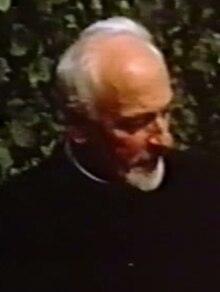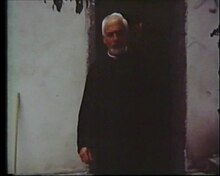Edgar Aristide Maranta
Edgar Aristide Maranta OFMCap (born January 9, 1897 in Poschiavo as Aristide Maranta , † January 29, 1975 in Sursee ) was a Swiss Capuchin , missionary and Roman Catholic Archbishop of Dar es Salaam .
Life
Aristide Maranta was born in Poschiavo in the canton of Graubünden . In 1917 he joined the order of the Capuchins , taking the name Edgar. He was ordained a priest on April 6, 1924 . In 1925 Maranta was sent on the mission to Tanganyika and appointed vicar at St. Joseph's Cathedral in Dar es Salaam by Bishop Gabriel Zelger . A little later he was to take over the office of school secretary and head of the central school in Kwiro , for which he went to London for a year in 1927 to acquire the teacher's license. Already on March 27, 1930, Maranta was, however, by Pope Pius XI. appointed Vicar Apostolic of Dar es Salaam at the age of only 33 to succeed the resigned Bishop Zelger . On August 17 of the same year, Maranta was ordained as the first titular bishop of Vinda .
When Pope Pius XII. the Apostolic Vicariate raised to the archbishopric in 1953 , Maranta became its first archbishop. From 1964 to 1966 he was also the Apostolic Administrator of Zanzibar and Pemba, today's diocese of Zanzibar . On December 19, 1968, Maranta resigned as Archbishop of Dar es Salaam. He was succeeded by Laurean Cardinal Rugambwa . As early as 1964, the interior of the country had been separated from Dar es Salaam as the diocese of Mahenge . Edgar Maranta spent his twilight years as titular archbishop of Castrum in San Vittore im Misox , where he supported his brother, Monsignore Reto Maranta, who was provost of the collegiate monastery, in pastoral care.
Work and personality

Under Edgar Maranta, the Capuchin mission in what was then Tanganyika, later Tanzania , experienced a significant boom. By the early 1920s, many Capuchins had succumbed to malaria . Maranta managed to successfully fight the disease among the missionaries by using quinine and building healthy houses. Numerous mission stations and parishes were established during his time as bishop. Maranta was considered conservative in church politics. The liturgical innovations of the Second Vatican Council , in which he had participated, were not easy for him, and he was “not very keen” on democratic innovations in the Church.
Maranta emphasized the Capuchin ideal of poverty in his way of life. He was also considered to be particularly practical, liked to take part in the construction of churches and schools himself and "gradually developed into an excellent auto mechanic " on his travels . The linguistically gifted Maranta dominated addition to his native Italian fluently Swiss German , German , French , English , Swahili and Latin .
On December 27, 1962, he was named Grand Officer of the Order of Merit of the Italian Republic.
literature
- Hilmar Pfenniger: Archbishop Maranta is dead . In: ite . Illustrated mission magazine of the Swiss Capuchins. Born 1975, No. 3 , 1975, p. 23-25 .
Web links
- Entry on Edgar Aristide Maranta on catholic-hierarchy.org
- Christian Schweizer: Maranta, Edgar. In: Historical Lexicon of Switzerland .
Individual evidence
- ↑ Hilmar Pfenniger: Archbishop Maranta is dead . In: ite . Illustrated mission magazine of the Swiss Capuchins. Born 1975, No. 3 , 1975, p. 25 .
- ↑ Hilmar Pfenniger: Archbishop Maranta is dead . In: ite . Illustrated mission magazine of the Swiss Capuchins. Born 1975, No. 3 , 1975, p. 24 .
- ↑ a b Hilmar Pfenniger: Archbishop Maranta is dead . In: ite . Illustrated mission magazine of the Swiss Capuchins. Born 1975, No. 3 , 1975, p. 23 .
- ^ Presidenza della Repubblica Italiana: Onorificenze Ordine al merito della Repubblica Italiana. Retrieved January 9, 2020 (Italian).
| predecessor | Office | successor |
|---|---|---|
| Joseph Gabriel Zelger OFMCap |
Vicar Apostolic of Dar es Salaam 1930–1953 |
1953 raised to the archbishopric |
| Archdiocese created in 1953 |
Archbishop of Dar es Salaam 1953–1968 |
Laurean Cardinal Rugambwa |
| personal data | |
|---|---|
| SURNAME | Maranta, Edgar Aristide |
| ALTERNATIVE NAMES | Maranta, Aristide (maiden name) |
| BRIEF DESCRIPTION | Swiss Capuchin, missionary and Archbishop of Dar es Salaam |
| DATE OF BIRTH | January 9, 1897 |
| PLACE OF BIRTH | Poschiavo |
| DATE OF DEATH | January 29, 1975 |
| Place of death | Sursee |

